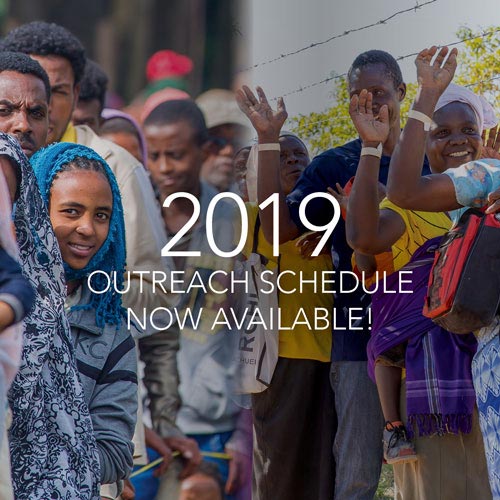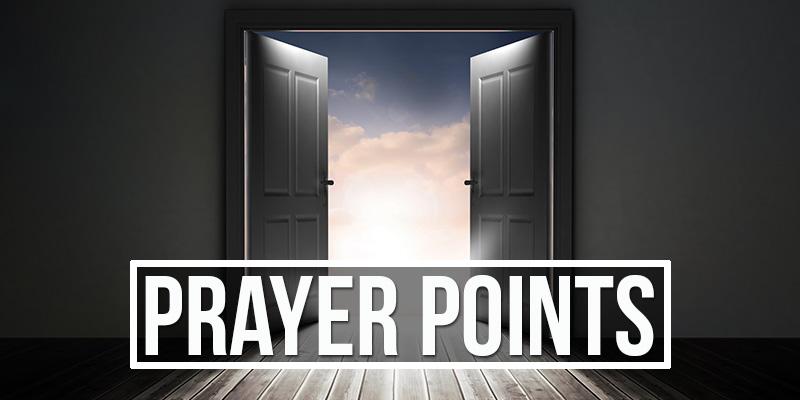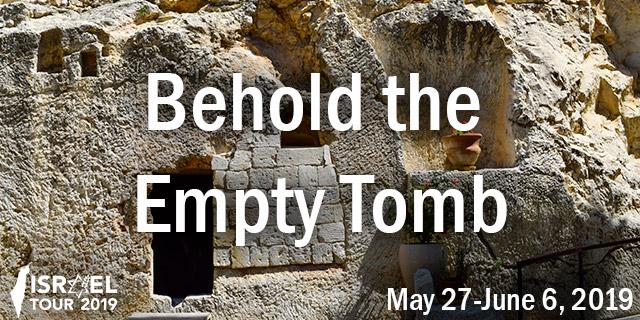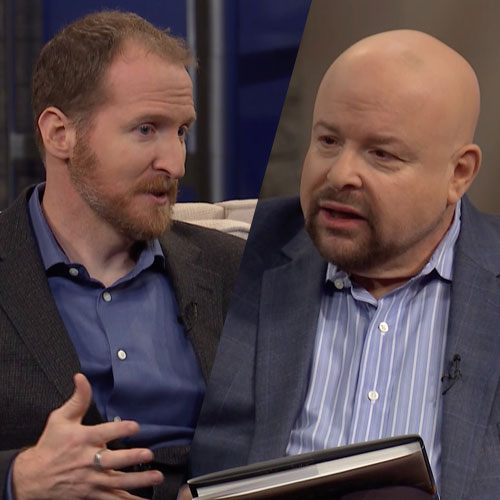2019 Outreach Schedule Now Available


Yeshua HaMashiach (Yeh-SHOO-ah Ha-Mah-SHEE-akh) is Hebrew for “Jesus the Messiah.” Yeshua is a shortened version of the name Yehoshua (Yeh-HO-shoo-ah), which means “Adonai saves.” Mashiach is the Hebrew word for Messiah and means “anointed one.”
Old Covenant Scriptures speak of the coming Messiah who would be God’s anointed One to deliver Israel and all mankind. Most Jewish people living at the time of Jesus believed the Messiah would physically save them from their oppression under Roman rule. They did not recognize that the prophets foretold of a much greater freedom.
Israel has had many enemies over the millennia, but none so dangerous as the one who seeks to keep her from recognizing God’s sole provision for eternal reconciliation to Him. Satan prowls and roars, schemes and steals, attacks and accuses (1 Peter 5:8, John 10:10, Ephesians 6:16, Revelation 12:10). He does everything in his power to mislead, blind, confuse and distract people, particularly the Jewish people, from the Messiah.
While the Jewish people looked for a savior to physically free them from bondage to Rome, God sent Yeshua HaMashiach to spiritually save us from bondage to sin, offering us eternal spiritual freedom.
The prophets foretold many details of the Messiah’s coming. Differing biblical descriptions have led some Jewish people to believe there would be two Messiahs: one who would suffer and die, and one who would conquer and reign. The Scriptures, in fact, describe two separate comings of one Messiah – Yeshua HaMashiach, Jesus the Anointed One.
In His first coming, Yeshua HaMashiach came as the Suffering Servant we see in Isaiah chapter 53. He came to fulfill our irreparable need of reconciliation to God. He proved Himself a humble servant offering us undeserved love and grace.
“Surely He has borne our griefs and carried our pains” (Isaiah 53:4).
“…because He poured out His soul to death and was counted with transgressors” (Isaiah 53:12b).
“For even the Son of Man did not come to be served, but to serve, and to give His life as a ransom for many” (Mark 10:45).
“…He began to wash the disciples’ feet, drying them with the towel wrapped around Him…” (John 13:1‒16).
Yeshua HaMashiach was appointed by God to suffer and die on our behalf. Anti-Semitic ideology wrongly blames the Jewish people for Yeshua’s death. But the Bible is clear that it was man’s sin that placed Jesus on the executioner’s stake.
“Because of oppression and judgment, He was taken away. As for His generation, who considered? For He was cut off from the land of the living, for the transgression of my people ‒ the stroke was theirs. Yet it pleased Adonai to bruise Him. He caused Him to suffer” (Isaiah 53:8, 10a).
“His appearance was disfigured more than any man, His form more than the sons of men” (Isaiah 52: 14b).
“But He was pierced because of our transgressions, crushed because of our iniquities. The chastisement for our shalom was upon Him, and by His stripes, we are healed” (Isaiah 53:5).
“From that time on, Yeshua began to show His disciples that He must go to Jerusalem and suffer many things from the elders and ruling kohanim and Torah scholars, and be killed, and be raised on the third day” (Matthew 16:21).
“But letting out a loud cry, Yeshua breathed His last. Then the curtain of the Temple was split in two, from top to bottom. When the centurion, who was standing in front of Him, saw the way Yeshua breathed His last, he said ‘This Man was really the Son of God’” (Mark 15:37‒39).
“Was it not necessary for Messiah to suffer these things and to enter into His glory?” (Luke 24:26).
With warmth and transparency, Jewish Voice’s own Messianic Rabbi Jonathan Bernis shares a compelling case for Jesus as Messiah and presents overwhelming evidence that can be traced to the Torah itself.
Yeshua HaMashiach took upon Himself the penalty that we deserve for our sin (Isaiah 53:8). In doing so, He provided for and offered us complete atonement.
“The Righteous One, My Servant, will make many righteous and He will bear their iniquities” (Isaiah 53:11b).
“We all like sheep have gone astray. Each of us has turned to his own way. So Adonai has laid on Him the iniquity of us all” (Isaiah 53:6).
“She will give birth to a son; and you shall call His name Yeshua, for He will save His people from their sins” (Matthew 1:21).
“For God so loved the world that He gave His one and only Son, that whoever believes in Him shall not perish but have eternal life. God did not send the Son into the world to condemn the world, but in order that the world might be saved through Him” (John 3:16–17).
“And it shall be that everyone who calls on the name of Adonai shall be saved” (Acts 2:21).
Scriptures prophesied that, while God’s Anointed One would suffer and die, He would also rise from the dead. Yeshua HaMashiach did just that.
“For You will not abandon my soul to Sheol, nor let Your faithful one see the Pit” (Psalm 16:10).
“He was cut off from the land of the living for the transgression of my people… If He makes His soul a guilt offering, He will see His offspring, He will prolong His days, and the will of Adonai will succeed by His hand” (Isaiah 53:8a, 10).
“He is not here. He is risen, just as He said! Come see the place where He was lying” (Matthew 28:6).
“For I also passed on to you first of all what I also received ‒ that Messiah died for our sins according to the Scriptures, that He was buried, that He was raised on the third day according to the Scriptures, and that He appeared to Kefa [Cephas, or Peter], then to the Twelve. Then He appeared to over five hundred brothers and sisters at one time” (1 Corinthians 15:3‒6a).
At His Second Coming, Yeshua HaMashiach will return as the conquering King foretold in the Hebrew Scriptures. At this time, the Jewish people will recognize Him as their Messiah.
“In that day His feet will stand on the Mount of Olives which lies to the east of Jerusalem, and the Mount of Olives will be split in two from east to west, forming a huge valley” (Zechariah 14:4).
“Then I will pour out on the house of David and the inhabitants of Jerusalem a spirit of grace and supplication, when they will look toward Me whom they pierced. They will mourn for him as one mourns for an only son and grieve bitterly for him, as one grieves for a firstborn” (Zechariah 12:10).
“And then they will see the Son of Man coming in clouds with great power and glory” (Mark 13:26).
“Look, He is coming with the clouds, and every eye shall see Him, even those who pierced Him. And all the tribes of the earth shall mourn because of Him. Yes, amen!” (Revelation 1:7).
After the Messiah returns, God will usher in the long-awaited Messianic age in which Yeshua HaMashiach will reign eternally.
“The scepter shall not pass from Judah, nor the ruler’s staff from between his feet until he to whom it belongs will come” (Genesis 49:10).
“When your days are done and you sleep with your fathers, I will raise up your seed, who will come forth from you after you, and I will establish his kingdom. He will build a house for My Name, and I will establish his royal throne forever” (2 Samuel 7:12–13).
“He shall reign over the house of Jacob for all eternity, and His kingdom will be without end” (Luke 1:33).
“Then the seventh angel trumpeted, and there were loud voices in heaven saying, ‘The kingdom of this world has become the kingdom of our Lord and of His Anointed One. And He shall reign forever and ever!’” (Revelation 11:15).
To learn more about how Yeshua HaMashiach fulfilled Messianic prophecies of the Tanakh, click to read “Who is Yeshua HaMashiach?” Discover the astounding mathematical probabilities that one man could fulfill even a small number of the hundreds of prophecies that Jesus did.
But the Israeli company took that to a whole new level last week when it supplied the vital technology necessary to save 12 Thai boys and their soccer coach trapped in a flooded cave with dwindling oxygen and little food.
“On every rescue mission, you need to coordinate the rescue team and to know at all times where they are, and what their status is,” explained Uzi Hanuni, MaxTech’s CEO. “These caves are very long, and you can’t send messengers back and forth through them. The divers need to be in constant contact with their base so that everyone knows where they are.
“No other system could work here, except ours,” said Hanuni, adding that it was essential to keeping the first responders alive.
Thanks to the hard work of MaxTech and many others around the world, the entire team and their coach were rescued. But few in the watching world realize just how much they relied on Israel’s innovation.
“Israel has a long record of developing innovative technologies for emergency situations,” says Israel21c, a nonprofit organization that publishes an online news magazine and maintains a website about 21st century Israel.
“Those have led to devices such as Water-Gen, a portable machine that can generate drinking water from the atmosphere and purify existing water sources; Pocket BVM, a collapsible resuscitation and respiratory support device; SkySaver, a personal rescue device that can evacuate a person from a building of up to 120 stories tall; and the Agilite Instant Harness, a rappelling harness that was used to save the lives of South African miners trapped underground in 2013.”
And Israel extends its technology assistance even to her enemies, through such programs as Operation Good Neighbor, which Israel launched in 2016. Through that initiative, soldiers frequently open gates on the Syrian border to welcome injured and sick men, women and children in need of Israel’s advanced medical technology.
“The Syrian war came to a point where people started showing up on our border looking for help,” explained Major Dr. Sergei Kotikov, a senior IDF officer. They had no trust and could not rely on their government, instead turning to (Israel), which for 50 years they were told was the enemy.”
“Everyone who comes here only has good things to say about the treatment they receive,” a Syrian mother told The Jerusalem Post. Her son was among those who had received treatment in Israel.
This same innovation keeps Israel at least one step ahead of attempts by Iran, Hezbollah and Hamas to decimate her.
“In a recent speech, the deputy commander of Iran’s Revolutionary Guards (IRGC) boasted that the ‘Islamic army in Syria’ in the Golan Heights was awaiting orders to eradicate the ‘evil regime’ of Israel,” The Times of Israel reported on July 9. Hossein Salami estimated that Iran had 100,000 missiles aimed at Israel. But Israel’s advanced, technologically acquired information allows her to prepare and defend herself.
Israel has for years used its advanced technology and intelligence techniques to wage a quiet campaign to keep Iran from entrenching itself in Syria, on Israel's border. The effort became less quiet in 2018.
In February, Israel shot down an Iranian drone carrying explosives and responded with a counterattack on an air base in Syria. In May, Iran sent 32 rockets toward Israel’s border with the Golan Heights border. Israel shot down four, and the rest destroyed infrastructure in the Golan Heights. Israel responded with a two-hour bombing of Iranian targets in Syria, destroying several Syrian air defense systems.
Lately, Hamas launched incendiary kites and balloons from Gaza into Israel, resulting in large fires that destroyed crops.
The situation escalated and Israel deployed its Iron Dome missile defense batteries across central Israel on July 15.
“The IDF is determined to continue to defend citizens of Israel and is prepared for a variety of scenarios that may intensify,” said a spokesperson for Israel’s army this week.
“The Israeli military said it would take harsh action in response to any attack from the coastal enclave, including in the form of incendiary kites and balloons,” reported The Times of Israel, adding, that IDF is “bracing for possible retaliation by Hamas, which rules the Gaza Strip.”
Several U.S. news outlets reported that Presidents Trump and Putin discussed working together to ensure Israel's safety during their summit in Finland on Monday.
“Both countries will work jointly,” President Trump said. “Creating safety for Israel is something that both President Putin and I would like to see very much.”
“This will bring peace to the Golan Heights and bring a more peaceful relationship between Syria and Israel and also to provide security for the state of Israel,” President Putin said.
As we thank God for how He has blessed Israel and that Israel, in turn, is blessing the world with its technology
That Israel’s good works will help in the fight against anti-Semitism


A few weeks ago, our Vice President of Global Outreach spoke to the Jewish Voice Ministries staff about the open doors before us and the opposition we face. He referenced 1 Corinthians 16:9, which says, "for a great door has opened wide for me, though many are in opposition" (TLV). He underscored not only the great outcomes we’ve had but also some of the big challenges we have faced on recent Outreaches.
He asked us to pray that the Lord will make us ready as we work to prepare the way for Him in the many places to which He calls us. He gave us five points of preparation. Let’s make them five points of prayer, with Scripture, to stir our faith.
The need is great. The call is urgent. And we must be ready. Join us in praying: LORD, PREPARE US as we prepare the way!
Promises: Lord, help us to know Your promises for Israel and the Jewish people. We need to know what You have said so we can join You in what You have promised to do.
⇒ Isaiah 55:11, Isaiah 62, Romans 11:25‒27, Hebrews 8:10
Prayer: Lord, we must be "prayed up." We must fill the reservoir of prayer to receive answers from You and heavenly assistance to be dispatched when we need it. Prayer is the foundation of our preparation.
⇒ Colossians 4:2‒4, Luke 18:1, Hebrews 4:16, James 5:16‒18
Perseverance: Lord, strengthen us to persevere when circumstances might cause us to want to give up. We can do all things through the Messiah who strengthens us.
⇒ James 1:2‒4, 12, Philippians 1:6, Romans 12:12, Hebrews 12:1‒2
Priorities: May we always seek to be rightly aligned with You, putting You first and seeing all else fall in line with You.
⇒ Matthew 6:33, Deuteronomy 6:5, Colossians 1:16‒18
Perceive: We are completely dependent on the spiritual wisdom and discernment that comes from You, Lord. May we hear Your "yes" as well as Your "no" with equal clarity and be able to perceive Your timing regarding the places You are calling us to serve.
⇒ Philippians 1:9‒10, Psalm 119:66, John 16:13‒15
We pray: LORD, our cry is the same as Moses. Without Your presence, we dare not go. And without You preparing us, we will not be ready to go. Thank You for doing in us what we can't do for ourselves as we press in asking You to prepare us for the fields white for the harvest before us in many lands. To You be the glory. In Yeshua’s name, AMEN.

The angel answered … ‘Do not be afraid, for I know you are looking for Yeshua who was crucified. Come, see the place where He was lying.’”
―Matthew 28:5-6
They came bearing spices. Grief-stricken, the women wished to honor their Lord, Yeshua (Jesus).
When they arrived at the tomb, the earth shook and a blindingly bright light appeared. The Roman guards trembled and then collapsed as if dead.
“Do not fear,” an angel told the women. “He is not here. He has risen, just as He said.” They looked at the enormous stone that had been rolled away and saw the open chamber.
“Remember what He told you,” the angel continued, “When He was still in Galilee saying that the Son of Man must be delivered into the hands of sinful men, and be executed, and on the third day rise up?” The women hurried away to tell the disciples.
Their words seemed like nonsense to the men. Even so, Peter jumped up and ran to the tomb. John followed. When he arrived, Peter went right inside to see for himself.
Empty.
Except for the grave clothes, which had been wrapped around Yeshua’s lifeless body just three days before, the burial place was empty!
Peter went home marveling. You will too.
“It is beyond words how it’s going to impact your life in positive ways. The Lord wants to meet you there in a special way. You’re going to return with a richness you’ll not get anywhere else.”
―Pamela
“My whole life, I wanted to go to the Holy Land to see with my very own eyes where the Messiah, the Son of the Living God, performed all His miracles. This experience increased my faith in the risen Lord and Savior Yeshua and brought me such a love for the Jewish people and their neighbors. I was so blessed to go with Jewish Voice Ministries International, and I learned so much from the teachings!”
―D. Nelson
“In Israel, I saw my faith confirmed in a way that is different than anything I’ve ever experienced. Israel awakens something in you that deepens your faith. It fed my spirit and gave me greater confidence; I can speak more boldly about my faith to anyone now.”
―E. N.

If you’re new to Messianic Judaism, you may be unfamiliar with many of the Hebrew words commonly used among Messianic Jews. We’ve put together a glossary of some words that will help you explore the beauty and richness that the Hebrew language and Jewish tradition can add to your New Testament faith.
baruch (barr-OOKH)
Baruch means “blessed.” Blessing God is an important part of Jewish and Messianic Jewish worship. Many blessings open with the phrase “Blessed are You, Lord our God, Ruler of the universe” and are followed by various lines specific to each occasion.
Brit Chadasha (BRIT Khah-dah-SHAH)
The Brit Chadasha is the New Covenant or New Testament of the Bible.
challah (KHAH-lah)
Challah is a sweet egg bread served on Shabbat and holidays. It is usually braided and can be made with many variations.
echad (eh-KHAHD)
Echad means “one.” More than a simple numeral, echad reflects a compound oneness that is fitting to describe God’s existence. Hear O Israel, the Lord our God, the Lord is one! (Deuteronomy 6:4).
Elohim (El-oh-HEEM)
Elohim is a name for God frequently used in the Old Covenant.
hallel (ha-LEL)
The literal translation of hallel is “praise.” In Jewish worship, “The Hallel” refers to the recitation of Psalms 113‒118 in the liturgy at various holidays.
HaShem (Ha-SHEM)
HaShem means “the name” and refers to the name of God. It is often included in blessings used in Messianic Judaism and traditional Jewish worship. Several Messianic congregations throughout the world are named Baruch HaShem, meaning “blessed be the name.”
kadosh (ka-DOSHE)
The translation of kadosh is “holy.” You will hear it often in prayers and worship songs within Messianic Judaism.
kedoshim (KED-oh-SHEEM)
The Tree of Life Version of the Bible replaces New Covenant references to Believers as “saints” with the Hebrew word kedoshim, which more clearly conveys the original meaning of the word as “holy ones.”
kippah (KEE-pah)
A kippah is also known as a skullcap or yarmulke (YAH-meh-kuh) in Yiddish. It is a small head covering worn by Jewish men during prayer, worship and teaching. It serves as a reminder of God’s presence and pre-eminence above man. Some non-Jewish men within Messianic Judaism also wear kippahs in the space of a Messianic Jewish synagogue.
kohen/kohanim (koh-HEN) (koh-ha-NEEM)
The word kohen means priest, and kohanim is its plural form. Have you ever met someone with the last name of Kohen, Cohen or Kahn? Their family name came from the ancient line of Jewish priests and often means their forefathers came from the sons of Aaron, the first high priest.
kohen gadol (koh-HEN gah-DOLE)
Many priests served the nation of Israel’s worship needs. However, there was only one high priest at a time. It was this kohen gadol who entered into the presence of God in the Holy of Holies once each year to bring atonement for the people. Messianic Judaism embraces Yeshua (Jesus) as our high priest who made complete atonement for our sin by His death (Hebrews 6‒10).
lashon hakodesh (lah-SHONE ha-KO-desh)
Hebrew is known as the lashon hakodesh, the “holy tongue,” spoken for millennia by God’s chosen people. It is the language of the Old Covenant Scriptures and is rich with subtleties and nuances that English often does not capture. In Jonathan Bernis’ Confessing the Hebrew Scriptures series, you can learn to proclaim and pray Scripture in the lashon hakodesh.
Mashiach (Mah-SHEE-akh)
The word Mashiach means Messiah or anointed one. The Old Covenant is filled with promises of the coming Messiah, the anointed one of God. The Brit Chadasha, or New Covenant, reveals Jesus as the Jewish Messiah prophesied throughout the Holy Scriptures. Most Jewish people still wait for the Messiah’s appearing while Messianic Jews recognize Him as Yeshua.
mezuzah (meh-ZOO-zah)
A mezuzah is a small container placed on the doorposts of homes. A little scroll of Scripture is placed inside according to the Torah’s command of Deuteronomy 6:4–9. Mezuzahs remind Jewish people that we are to love the Lord with all our heart, mind, soul and strength. As an intentional act of remembrance, many Jewish people and Messianic Jews make a point of touching the mezuzah as they pass through doorways affixed with them.
mitzvah (mitz-VAH) / mitzvot (mitz-VOTE)
The Hebrew word for “commandment” is mitzvah. When a Jewish boy goes through his Bar Mitzvah ceremony, he becomes a “son of the commandment.” Mitzvot is the plural of mitzvah, meaning commandments.
Moad (MO-ed) / moadim (mo-eh-DEEM)
The Hebrew word used in the Bible for a Feast of the Lord is moad, which means “appointed time” (see Leviticus 23). The plural form is moadim.
parasha (par-a-SHAH)
The parasha is a weekly Scripture reading recited in Jewish synagogues. Each week the parasha – meaning portion in Hebrew - includes a part of the first five books of the Bible, called the Torah or Pentateuch. By the end of the year, worshipers have read the entire Torah, and the cycle begins again. Messianic Judaism continues this tradition connecting the parasha to images of Yeshua found in the Torah.
Pentateuch (PENT-ah-touk)
The Pentateuch comprises the first five books of the Hebrew Scriptures (Old Covenant), which were written by Moses. This collection of instructional books is also known as the Torah.
ruach (ROO-ach)
The Hebrew word for “spirit” is ruach.
Ruach HaKodesh (ROO-ach Ha-KO-desh)
“The Holy Spirit” is known in Hebrew as the Ruach HaKodesh.
Selah (SAY-lah)
You’ve probably noticed this little word in the book of Psalms. It typically appears between passages within a single psalm. It means “pause,” and it is a directive to the reader to linger a moment and reflect on what was just read before moving on to the next verse.
Shabbat (Shah-BAHT) / Shabbatot (Shah-bah-TOTE)
Shabbat means “Sabbath” and is the seventh day of the week, or Saturday on the Gregorian calendar. The word Shabbat means “rest” reflecting back to the Lord’s rest after six days of Creation. The Jewish day begins and ends at sunset, so the Shabbat starts on Friday evening when the sun goes down and ends at sunset on Saturday. Synagogues and Messianic Jewish congregations conduct services on either Friday evening or Saturday morning, sometimes both. Several of the biblical Feasts call for a Shabbat, a rest, on a particular day. On these holy days, God commanded that no work be done, just as for the weekly Shabbat. Shabbatot is the plural of Shabbat.
Shalom (shah-LOME)
You may already know that shalom means “peace.” What may be new to you is that the word conveys much more than that. It also denotes the concept of “completeness” and “wholeness.” Knowing the fuller meaning of shalom enriches our understanding of Scripture – especially such passages as Psalm 122:6 in which God commands us to pray for the shalom of Israel and John 14:27 in which Yeshua told us about the extraordinary peace He gives. Shalom can also be used as a greeting and farewell.
Shema (Sheh-MAH)
Shema means “hear, listen.” It is the opening word used in Deuteronomy 6:4. The Shema is a Jewish prayer recited morning and evening taken from three Scripture passages (Deuteronomy 6:4‒9, 11:13‒21 and Numbers 15:37‒41). Messianic Judaism has adapted the Shema, and it is commonly sung to open worship services and prayer gatherings.
Shema Yisrael (Hear O Israel)
Adonai Eloheynu (the Lord our God)
Adonai Echad (the Lord is one).
Baruch Shem Kavod (Blessed is the name of His glorious)
Malchuto L’olam Vaed (Kingdom for all eternity).
shofar (SHO-far) / shofarim (sho-far-EEM)
The shofar is a ram’s horn that is blown like a trumpet. When Joshua and the Israelites circled the city of Jericho and on the seventh day blew trumpets that frightened and confused the inhabitants, it was this type of horn they blew. (See Joshua chapter six.) The shofar is used today in Jewish synagogues and Messianic Jewish congregations as a call to worship and on various Jewish holidays. Shofarim is plural.
tallit (tah-LEET)
A tallit is a woven prayer shawl worn during worship and prayer, primarily by men.
Talmud (Tal-MOUD)
The Talmud is the collection of Jewish oral tradition interpreting the Torah.
Tanakh (Tah-NAKH)
The Tanakh is the entirety of Hebrew Scriptures, known to Christians as the Old Covenant or Old Testament. The word Tanakh was formed from the first letters (TNK) of the three sections into which the Jewish Scriptures are divided: the Torah (instruction), Neviim (prophets) and Ketuvim (writings).
With warmth and transparency, Jewish Voice’s own Messianic Rabbi Jonathan Bernis shares a compelling case for Jesus as Messiah and presents overwhelming evidence that can be traced to the Torah itself.
tefillin (teh-fih-LEEN)
In Deuteronomy 6:4-9, God commands Jewish people to diligently keep, speak of and teach His Word. He instructs them to bind it on their hands and foreheads and place it on their doorposts. Tefillin are small boxes that Jewish males tie onto their upper arm and forehead with long straps. The boxes have Scriptures inside in keeping with this commandment and are worn each weekday morning.
teshuva (teh-SHOO-vah)
Teshuva is the Hebrew word for repentance and means “turning back” or “returning.” Teshuva is vital to restoring one to a right standing with God and is especially highlighted from the month preceding the Feast of Rosh Hashanah and through Yom Kippur, the Day of Atonement.
Torah (TORE-ah)
Torah means “instruction.” The books of Moses comprise the Torah. These are the first five books of the Hebrew Scriptures, which are also called the Pentateuch. The Torah is part of the Tanakh.
tzedakah (tzeh-DAH-kah)
The Hebrew word for righteousness or acts of charity is tzedakah. Jewish synagogues and Messianic Jewish congregations commonly have a “tzedakah box” designated for giving money toward charity.
tzitzit (TZEET-zeet)
The long fringes attached to the four corners of a tallit are called the tzitzit. They are a reminder of the Lord’s commandments, that Jewish people would perform them as the Lord instructs.
Yeshua (Yeh-SHOO-ah)
Yeshua is the Hebrew name for Jesus. It means “salvation.” Messianic Jews recognize Yeshua as the Messiah revealed throughout the Hebrew Scriptures.
Yeshua HaMashiach (Yeh-SHOO-ah Ha-Mah-SHEE-akh)
Yeshua HaMashiach means “Jesus the Messiah” in Hebrew. The word Christ is not found in the Hebrew Scriptures. It is from the Greek word christos, which bears the same meaning as Messiah, that of “anointed one.”
The Messianic Jewish Family Bible is the first and only of its kind. This exciting new Bible translation unites Old and New Covenant with a consistent Hebraic perspective.